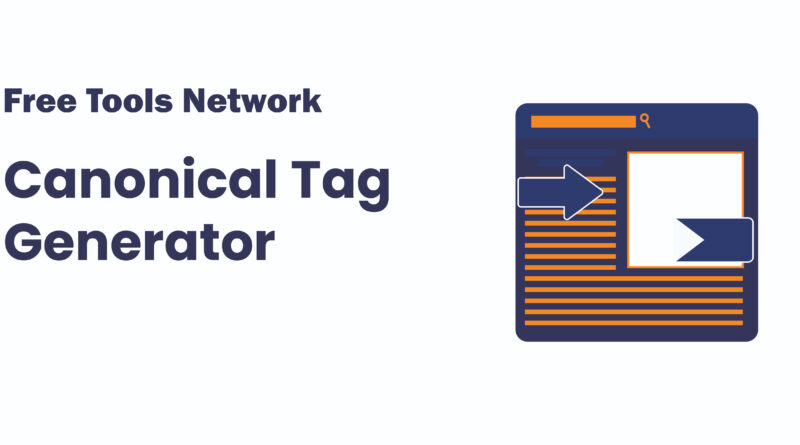The Secret Weapon for SEO Pros: Canonical Tags Generator
In the evolving world of digital marketing, canonical tags have become an essential tool for SEO professionals. The Canonical Tags Generator stands as a crucial asset for anyone aiming to enhance their website’s SEO performance. But how does it actually work, and why is it so vital for SEO pros? In this guide, we’ll explore the intricacies of using a Canonical Tags Generator and take a deep dive into its application alongside YouTube tags generators for an all-encompassing SEO strategy.
What Are Canonical Tags?
Canonical tags, also known as “rel=canonical,” tell search engines which version of a page is the primary one. This becomes critical when there are multiple versions of the same content or very similar pages that could be mistaken for duplicates. By clearly identifying the main page, SEO professionals can ensure their ranking power isn’t diluted by content redundancy.
How Canonical Tags Affect SEO Rankings
The proper implementation of canonical tags can directly affect a website’s search engine ranking. Search engines like Google reward websites that have clean, structured, and unique content. Mismanaged duplicate content, on the other hand, can lead to a split in SEO equity and a reduction in overall rankings.
Canonical Tags vs. 301 Redirects
While both are used to manage multiple URLs, they serve different purposes. A 301 redirect tells search engines that a page has permanently moved, and users should be directed to the new location. Canonical tags, on the other hand, allow the original page to remain live but tell search engines which one to prioritize in rankings.
Common Mistakes with Canonical Tags
Even SEO pros make mistakes when implementing canonical tags. Some of the most common errors include pointing canonical tags to the wrong URL, failing to implement them across all pages, or using them on dynamic pages that should be handled differently. These mistakes can harm your SEO efforts rather than help them, so careful implementation is key.
How to Use a Canonical Tags Generator
Using a Canonical Tags Generator simplifies the process for SEO professionals. Instead of manually editing HTML code across hundreds of pages, a generator automates the process. Here’s how you can use it:
- Step 1: Input the URL you want to canonicalize.
- Step 2: Select the main version of the page (if you have similar versions).
- Step 3: The generator will create the proper canonical tag, which can then be inserted into your page’s code.
The Benefits of Using a Canonical Tags Generator
A Canonical Tags Generator offers several benefits:
- Efficiency: It saves time by automating a repetitive task.
- Accuracy: Reduces human errors, ensuring the right URLs are always tagged.
- Scalability: Makes it easy to apply canonical tags across large websites with many similar pages.
Best Practices for Implementing Canonical Tags
To maximize the effectiveness of canonical tags:
- Avoid Self-Referencing Canonical Tags: These are often redundant and can cause confusion.
- Use Absolute URLs: Always use the full URL when specifying canonical tags, as relative URLs can cause issues.
- Test Your Tags Regularly: SEO environments change constantly, so ensure your canonical tags are still functioning as intended.
YouTube Tags Generator and Its Role in SEO
When optimizing video content, especially on platforms like YouTube, tags become an essential element in improving visibility. A YouTube Tags Generator helps you identify the best keywords for your video, ensuring it reaches the right audience. Much like canonical tags, these can improve your SEO by making your content easier to find.
How a YouTube Tags Generator Works
A YouTube Tags Generator analyzes your video content, title, and description to suggest the most relevant and high-ranking tags. These tags help categorize your content and ensure it appears in search results for related topics. This is particularly useful for video marketers looking to boost their content’s organic reach.
The Synergy Between Canonical Tags and YouTube Tags
Combining the power of both canonical tags and YouTube tags can create a comprehensive SEO strategy. While canonical tags help refine your website’s content, YouTube tags expand your reach within video search platforms, making your content more discoverable.
Free vs. Paid Canonical Tags Generators
There are both free and paid Canonical Tags Generators available on the market. Free tools often offer basic functionality, while paid versions provide advanced features, such as bulk processing and integration with CMS platforms.
Case Study: Improving SEO with Canonical and YouTube Tags Generators
A digital marketing agency implemented both Canonical Tags Generator and YouTube Tags Generator tools across a client’s website and YouTube channel. Within three months, the website’s organic traffic increased by 30%, and YouTube videos started ranking on the first page for key industry terms.
Advanced Tips for Mastering SEO with Tags Generators
For more advanced users, there are a few key strategies to keep in mind when using tags generators:
- Combine with Schema Markup: Enhance the search engine’s understanding of your content by combining canonical tags with schema markup.
- Use in Multi-Language Websites: If you’re running a multi-language website, ensure your canonical tags point to the correct language version to avoid duplicate content issues across different locales.
- A/B Test Tag Effectiveness: Periodically test different canonical tag setups to see which configuration yields better results.
FAQs
1. What is a canonical tag? A canonical tag is an HTML element used to prevent duplicate content by specifying the main version of a page.
2. How does a Canonical Tags Generator work? A Canonical Tags Generator simplifies the creation of canonical tags, automating the process and ensuring the correct URL is tagged.
3. What is the difference between a canonical tag and a 301 redirect? A canonical tag tells search engines which version of a page is primary, while a 301 redirect moves traffic from one URL to another.
4. Are YouTube tags important for SEO? Yes, YouTube tags help categorize your video content, making it more discoverable in search results.
5. Can I use a Canonical Tags Generator for free? Yes, there are free tools available, but paid versions often offer more advanced features.
6. Do canonical tags affect my SEO ranking? Yes, properly implemented canonical tags help concentrate your ranking power and avoid penalties for duplicate content.




